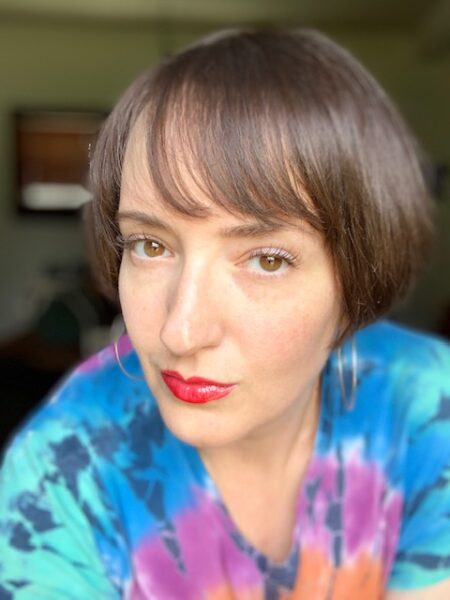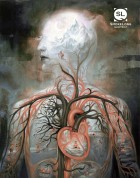I’m so interested in your thought process behind some of the decisions you made writing “We All Know About Margo.” First, why did you choose this particular POV—first-person plural? It’s a bold choice to give this narrative over to what I read as a group of young men.
The first time I read first-person plural was in Jeffrey Eugenides’ The Virgin Suicides, and then again in Hannah Pittard’s The Fates Will Find Their Way. I loved both novels, and I was curious about how this POV might work in shorter fiction. I first considered it after the Steubenville rape case, which called up some of my own disturbing memories. I circled back to it this spring when I wrote about one of those memories in an essay on horror, and I wrote this story in tandem with that essay. I wondered what it would mean to allow the perpetrators to wrest control of the narrative while they wrested control of a young woman’s body. I knew it could be upsetting for readers, but I hoped my decision would seem warranted.
As a follow-up, the young men know Margo so intimately, both physically and psychically. How did you broach the idea and ultimately decide to let the young men have access to Margo’s thoughts, experiences, and personal history?
It was important to me that Margo read as a real person undergoing a horrible experience. And I think—I hope—she reads as more real than the narrators. I wrote these boys as somewhat flat on purpose, situationally and culturally rooted in their id, driven by power and collusion and lust in the story’s moment. I also wanted to emphasize how easy it is to take tidbits of information and construct a human representation that seems real but that’s really just a shadow. Each boy in this story knows a little about Margo, but none of them can fully assemble her. Only the reader can do that; only the reader gains access to the boys’ collective thoughts, the tidbits they’ve learned but never shared with each other. I wanted the story to remind readers of both how important collective knowledge is and how impossible it is for us to have full access to it.
With Margo having very little (apparent) agency in the story and the young men offering up a kind of first-person-plural, peripheral narration, who would you say this story is ultimately about?
The story is in part about our inclination towards making snap judgments based on limited information. But while I was writing, I also kept returning to the two novels I mentioned, both about girls who either disappeared or died. I know Nora Lindell’s fate was undetermined, but I always read escape as unlikely. The Lisbon sisters certainly don’t escape. I wanted to write a story about the girl who experiences something horrible but survives. That moment where the boys force themselves to forget Margo at the end can read on one hand as Margo’s erasure, but those boys are still stuck in the town where they grew up, living the same lives they always have. In a way, their forgetting means Margo’s freedom. So to me, this story is about the girl who lives. I wrote it in large part for those girls, too. There are a lot of us out there. It’s an idea that’s become central to my recent work.
The issue of consent reads as a pivotal one in this story. I’m curious—is there a definitive meaning and message you hope readers will glean from the story? Are you putting this story into the world to illustrate the complexities of consent, sex, sexuality, and other such themes? Perhaps neither, or both?
I don’t see this as a story about sex. Women can of course be sexual creatures and enjoy the fuck out of sex. But this story turned out to be about imbalances of power and the sometimes-muddy nature of consent. Please don’t mistake me: Consent should never be muddy. But it often is. We tell kids all the time that stating their wants will produce clarity, but in certain situations, we all know that isn’t true. Margo whispers to Andrew that she wants to be taken home; Andrew tells her it’s too late. Sure, none of the other boys overhear it. It’s just another Saturday night to them, like a dozen others before. But that’s the problem. They should hear Margo. They should be listening, and Andrew should be magnifying that whisper when Margo can’t. If consent were as simple as stating wants, Margo’s whisper would reverberate through that room because everyone would be paying attention and boosting her voice. Our cultural imperative shouldn’t just be to tell women to speak up. It should be to teach men to listen and respond appropriately. If we taught them to listen rather than look first, then maybe cultural conceptions of women and our understanding of consent dynamics would be healthier.
Lastly, I’d love to know which writers you’re currently reading, as well as who has, most recently, made an impact on your own writing.
I’ve been reading a lot of work by women that speaks to the kind of person Margo is, what we always call a “difficult woman.” That’s partly because I’m currently teaching a literature class with a “difficult women” theme, so I’ve been rereading Roxane Gay’s short story collection of the same name, alongside texts by Nella Larsen, Zora Neale Hurston, and Sandra Cisneros. Kristen Arnett and Emma Copley Eisenberg are two of my long-form fiction favorites, but I’ve also been reading a lot of flash by, among others, Megan Giddings, Carmen Maria Machado, Leesa Cross-Smith, Monet Patrice Thomas, and of course, the inimitables Kathy Fish and Cathy Ulrich. All of these women write female protagonists whom society unquestioningly classifies as problematic, and I admire the hell out of how well they do it, with stark honesty and compassion and deeply unsettling insights.




 The core workshop of SmokeLong Fitness is all in writing, so you can take part from anywhere at anytime. We are excited about creating a supportive, consistent and structured environment for flash writers to work on their craft in a community. We are thrilled and proud to say that our workshop participants have won, placed, or been listed in every major flash competition. Community works.
The core workshop of SmokeLong Fitness is all in writing, so you can take part from anywhere at anytime. We are excited about creating a supportive, consistent and structured environment for flash writers to work on their craft in a community. We are thrilled and proud to say that our workshop participants have won, placed, or been listed in every major flash competition. Community works.